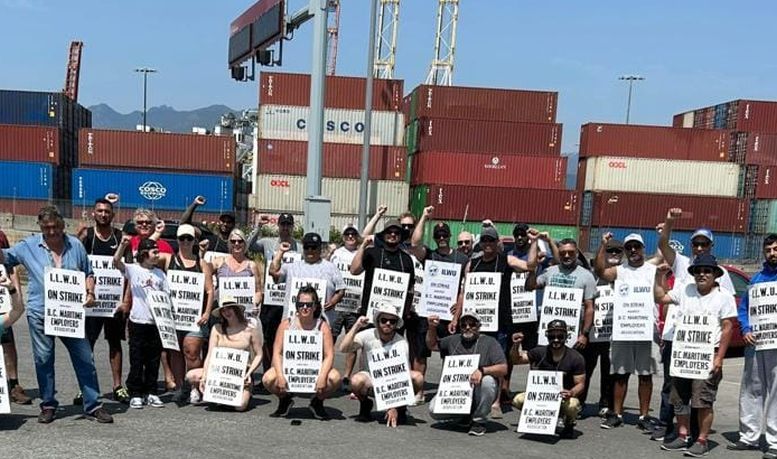Tim Heffernan and Bill Hopwood, from Socialist Alternative Issue #26
The rising cost of living, boosted by high interest rates, continue to hit workers hard. In Canada and around the world there has been an upturn in strikes. As Mick Lynch, a British union leader, stated, “The working class is back, and we refuse to be poor anymore.”
In Canada over two million working days were lost in strikes in 2022, the most since 2009. So far, 2023 is set to beat this. This upturn in action is partly driven by the soaring cost of living, as well as a general feeling of being undervalued by the bosses, especially after the experiences of working during COVID.
Strike ballots regularly win majorities of over 90 percent as workers demand better pay and conditions and they expect their union’s leadership to fight for that. In several notable cases, tentative agreements (TA) recommended by union leaders have been rejected by the membership as they tell their officials to go back to the bargaining table and do better.
Torontos 3,700 Metro grocery workers, organized by Unifor, voted 100 percent for strike action! This followed the bargaining committee unanimously recommending a four-year deal, with an endorsement from Unifor’s president Lana Payne: “This is a milestone agreement that underscores Unifor’s deep commitment to grocery workers in the retail sector and our important work to advance their workplace rights.” The membership didn’t agree, they rejected the TA and went on strike, with widespread public support. They saw record profits, up 26 percent from a year ago. The courts stopped them from picketing the warehouses. As we go to print, they are voting on a new agreement. [Update the deal was accepted although it didn’t improve pay for the casual workers.]
Longshore in BC Resist Attacks
The 7,400 longshore workers in BC, in the International Longshore and Warehouse Union (ILWU), successfully resisted an attempt by the employers, aided by the federal government, to restrict the right to strike and weaken the union. The membership voted 99.24 percent for strike action that started on July 1. As well as pay, the key concern was the employers’ attack on jobs through automation and contracting out of maintenance work that had been done by ILWU members.
The employers never took negotiations seriously, walking away multiple times. They, both the shipping lines and the port operators, made record profits during COVID, but still wanted to weaken the union through contracting out. They, supported by big business across Canada, demanded that the federal Liberals intervene. The government did intervene. Although it did not invoke back-to-work legislation, the threat hung in the air.
On July 12, the federal Liberal’s Labour Minister gave ILWU and the employers 24 hours to accept or reject his proposals, which leaned to supporting the employer on three out of four points. The ILWU’s bargaining committee suspended pickets while it democratically decided on the proposal. The larger and more representative delegates’ caucus rejected the proposal as it did not address job security. ILWU re-started the pickets, only for the government to declare them “illegal,” although the strike had not been ended.
Again, the pickets were suspended, and more negotiations followed, resulting in a second proposal that was rejected in a vote of the membership. Finally, the employer got the message and added language to protect jobs. While this was being voted on, the government again interfered, issuing a warning to that union’s leadership.
The employers and the government do not like union democracy. They are unhappy that union members have a say in their own contracts, which reflects their class outlook and how they wish society is run.
The union membership stood solid in face of all the threats and eventually won a better contract.
Strikes Across Canada
Strikes aren’t confined to the major urban areas. In Iqaluit, the capital of Nunavut, a 130-day strike of 13 members of the Public Service Alliance of Canada working at the Iqaluit Housing Authority (IHA) ended with a significant improvement in pay. The IHA used scabs, but this failed to defeat the workers.
In Manitoba, 1,400 workers at the publicly-owned Liquor Mart started a strike on July 19 after being without a contract for over a year. The employers offered a two percent wage increase each year, with a signing bonus for some workers. A new tentative agreement was accepted at the end of August.
A common thread in many strikes is that workers demand respect, after being described as “essential workers” as they worked throughout COVID. While the corporations, such as shipping and grocery stores, made record profits the workers risked their lives and health to keep society going. While grocery companies introduced “hero pay” of a $2-an-hour increase, it was rapidly canceled as soon as the first wave subsided in January 2022. As many workers said, they went from “heroes” to “zeroes.” In Manitoba, the union president stated that workers deserve fair wages “after working through the pandemic and a slew of violent thefts.”
Windsor Salt workers, 250 members of Unifor, rejected a first tentative agreement (TA) and, after being on strike since February, accepted a much improved second offer.
Another significant Ontario strike, recently concluded after 41 days, was at Hamilton’s National Steel Car, involving 1,400 workers at a rail manufacturing plant. They were fighting for wage increases as well as improvements to the terrible safety conditions at the plant. Three workers have died on the job in recent years and in July National Steel Car was fined $140,000 for failing to maintain safe working conditions. Although there was a low strike vote the workers stood solid. “We went out with only a 52 percent majority … but our presence on the picket line was 100 percent,” said the union local’s president. The new contract has a 13 percent wage increase over three years, with six percent in the first year, a $1,000 signing bonus, and improved health and safety benefits.
Cost of Living Hurts
Canada’s overall inflation in 2022 was 6.8 percent, with food and housing costs rising more. Rents are up 21 percent in the last two years, mortgages are soaring due to the huge increase in interest rates by the Bank of Canada from 0.25 percent in 2022 to 5 percent now. Some headline pay increases may look impressive but as inflation continues these gains can rapidly disappear.
Workers need to return to the idea of cost-of-living Adjustments (COLA) in all their contracts, which were common in the late 1970s. These provide an automatic increase in pay in line with the cost of living.
Build Union Power
In the cases of Metro, Windsor Salt and ILWU, workers have not been afraid to reject the recommendations of their union leaderships by voting down bad tentative agreements. This is significant for asserting internal union democracy and for showing that the members are not mere rubber stampers for the union leadership.
However, union leaders should be more attuned to the members’ determination and energy and provide bold, strong a direction. Many strikes are lasting longer than they did a few years ago, both because workers want better contracts, and because the employers are resisting their demands.
This autumn there are major negotiations by Québec’s public sector and Ontario teachers. Unifor autoworkers voted 98 percent for strike action as they gear up for negotiations with the big three automakers. In these cases, and in other looming struggles, workers will need to stand strong to overcome the bosses’ greed.
Socialist Alternative supports:
- Fighting, democratic unions run by and for the membership to campaign for better pay and working conditions.
- Full-time union officials and representatives to be elected regularly from the membership, subject to recall and to receive the same wages as those they represent.
- Unions to play a leading role in building broader movements for social change.
- Unions to organize the unorganized with bold campaigns and solidarity in struggles.




